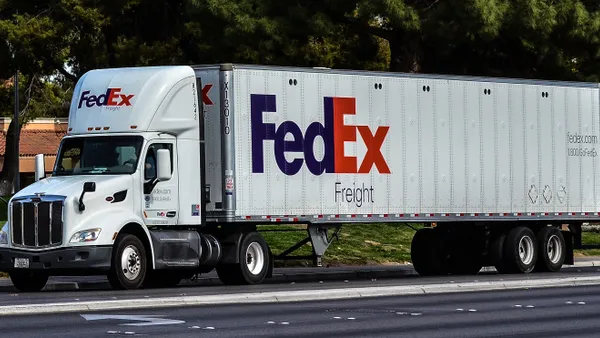Dive Brief:
- Uber Freight launched a tool Thursday allowing shippers to view and book real-time market rates up to two weeks in advance.
- The tool, known as Lane Explorer, enhances visibility in freight booking, "setting a new standard for price transparency," Uber Freight said.
- The same day, Convoy announced the launch of Shipper Platform 2.0, giving shippers access to data on market trends and "detailed lane-level insights."
Dive Insight:
Lane Explorer and Shipper Platform 2.0 enable shippers with the power of information, creating greater transparency in freight booking.
"Today, you wouldn't buy a flight without comparing ticket prices," Uber Freight wrote in a blog post. A spokesperson for Uber Freight compared Lane Explorer to Google Flights.
"It’s great to be able to look at a two-week window and decide whether or not it makes sense to ship it on a Monday, Wednesday, or the following Monday," Bill Heslam, VP of Sales for Narragansett Beer, said in the blog post.
Convoy's new platform gives shippers information in the form of market trends by region and specific lane data. "A more efficient supply chain starts with helping all shippers make smarter buying decisions," the company said in their announcement. Convoy said any shipper can access the insight, even if they choose not to book shipments through Convoy.
Uber Freight and Convoy — both relatively young companies — have been making a splash in the freight market since their inceptions.
Convoy launched in 2015 and raised $185 million in a September 2018 funding round, bringing its total value to more than $1 billion. Uber Freight is a newer player in the market, launching in May 2017 and opening up its platform to shippers in August 2018.
Both companies work on an "on-demand" trucking model, facilitating load booking on the spot market rather than through contracts.
The concept challenges the traditional notion of shipper-carrier relationships. It remains to be seen how prevalent on-demand trucking will become in the supply chain, especially among large shippers with long-standing relationships with carriers.
The platforms may prove more popular with small shippers with less bargaining power, looking to book a load with a carrier at a competitive rate. Convoy said shippers are overpaying for freight because they lack open information on markets and lanes.














